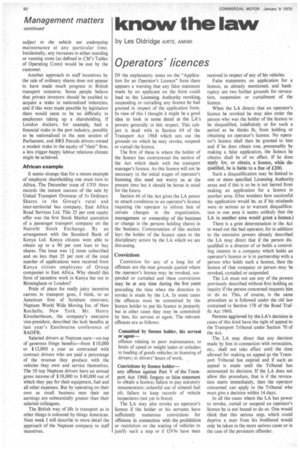Management matters
Page 56

If you've noticed an error in this article please click here to report it so we can fix it.
continued subject to the vehicle not undergoing maintenance at any particular time. Incidentally, any increases in either standing or running costs (as defined in CM's Tables of Operating Costs) would be met by the customer.
Another approach to staff incentives by the sale of ordinary shares does not appear to have made much progress in British transport concerns. Some people believe that private investors should be enabled to acquire a stake in nationalized industries; and if this were made possible by legislation there would seem to be no difficulty in employees taking up a shareholding. If London dockers, for example, had a financial stake in the port industry, possibly to be nationalized in the next session of Parliament, and BRS Parcels drivers owned a modest stake in the equity of "their" firm, a less trigger-happy labour relations climate might be achieved.
African example It seems strange that for a recent example of employee shareholding one must turn to Africa. The December issue of UTO News records the instant success of the sale by United Transport Overseas of 5s Ordinary Shares in the Group's rural and inter-territorial bus company, East Africa Road Services Ltd_ This 25 per cent equity offer was the first Stock Market quotation of a passenger transport company on the Nairobi Stock Exchange. By an arrangement with the Standard Bank of Kenya Ltd. Kenya citizens were able to obtain up to a 90 per cent loan to buy shares. The issue was lf times subscribed and no less than 25 per cent of the total number of applications were received from Kenya citizen employees of Group companies in East Africa. Why should this form of incentive work in Kenya but not in Birmingham or London?
Pride of place for really juicy incentive carrots in transport goes, I think, to an American firm of furniture removers, Neptune World Wide Moving Inc. of New Rochelle, New York. Mr. Henry Kirschenbaum, the company's executive vice-president, described the lush benefits at last year's Eastbourne conference of BAOFR.
Salaried drivers at Neptune earn—on top of generous fringe benefits—from $10,000 to $ 12,000 a year as contrasted with contract drivers who are paid a percentage of the revenue they produce with the vehicles they own and service themselves. The 50 top Neptune drivers have an annual gross income of 1138,000 to $40,000 out of which they pay for their equipment, fuel and all other expenses. But by operating on their own as small business men their net earnings are substantially greater than their salaried colleagues.
The British way of life in transport as in other things is coloured by things American, Next week I will describe in more detail the approach of the Neptune company to staff incentives.








































































































